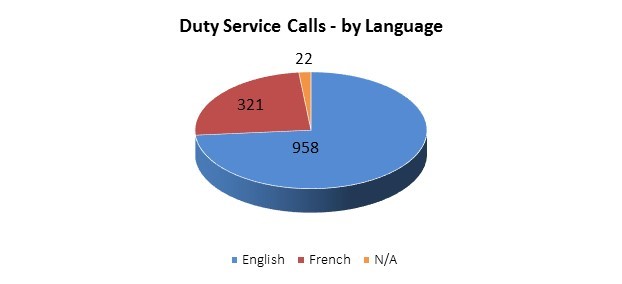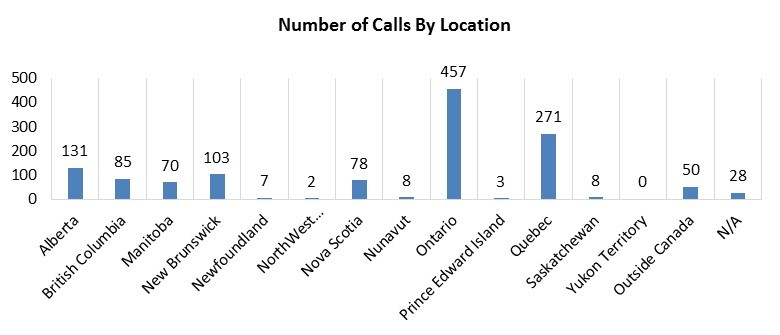Director of Defence Counsel Services Annual Report 2018-2019
Related links
| Fund | Expenditure | |
|---|---|---|
| C125 | Contracting (Counsel, Experts, and Services) | $156,384.20 |
| L101 | Operating Expenditures | $161,097.99 |
| L111 | Civilian Pay and Allowances | $173,424.81 |
| L127 | Primary Res Pay, Allowance, Ops, Maintenance | $234,052.80 |
| Total | $724,959.80 | |
17. This amount is slightly less than our projected business plan of $774,900.00 and represents stable funding over the past few years.
18. Within Defence Counsel Services there are three methods of service delivery; regular force counsel, reserve force counsel and, pursuant to subsections 249.21(2) and (3), of the National Defence Act, contracted counsel. Regular force counsel are the most cost effective means of service delivery and do not require the expenditure of budgeted funds. The use of reserve force counsel and contracted lawyers come at a cost.
Services, Activities and Training
Duty Counsel Services
19. Legal advice is available twenty-four hours a day, seven days a week, to members who are under investigation or in custody. Legal advice is typically provided through our duty counsel line, a toll-free number which is distributed throughout the Canadian Armed Forces and is available on our website or through the military police and other authorities likely to be involved in investigations and detentions under the Code of Service Discipline.

Duty service calls by language: Pie chart illustrating 958 English calls in blue, 321 French calls in red, and 22 calls in orange where language of call was not recorded.
20. During the reporting period, Defence Counsel Services recorded 1,301 calls on the duty counsel line. Services were provided in both official languages. The language of service was divided generally between English for 958 calls and French for 321 calls as depicted in the chart below. In 22 cases, the language of call was not recorded.
21. The calls ranged in duration but, on average, lasted for approximately 15 minutes. Calls originated from every Canadian province and territory, as well as various locations outside of Canada from members serving abroad. The number of calls by location is illustrated in the graph below.

See below for description of graph.
| Location | Number of Calls |
|---|---|
| Alberta | 131 |
| British Columbia | 85 |
| Manitoba | 70 |
| New Brunswick | 103 |
| Newfoundland | 7 |
| Northwest Territories | 2 |
| Nova Scotia | 78 |
| Nunavut | 8 |
| Ontario | 457 |
| Prince Edward Island | 3 |
| Québec | 271 |
| Saskatchewan | 8 |
| Yukon Territory | 0 |
| Outside of Canada | 50 |
| N/A | 28 |
Court Martial Services
22. When facing court martial, accused persons have the right to be represented by lawyers from Defence Counsel Services at public expense, they may retain legal counsel at their own expense, or they may choose not to be represented by counsel.
23. During this reporting period approximately 58% of those who requested representation by Defence Counsel Services were, as shown below, able to move forward without conviction.
24. Defence Counsel Services provided legal representation to accused persons in 170 files referred for prosecution. This number includes 82 cases carried over from the previous reporting year. It also includes 88 new cases assigned to defence counel during this reporting period. Of these 170 client files, 96 were completed. Of these 96, 51 members had their charges withdrawn after the assignment and involvement of counsel for the defence. Of the remaining 45 cases involving counsel appointed by the Director, in four cases the accused was found not guilty of all charges, one case was terminated by a Military Judge, and in 40 cases the accused was either found guilty or plead guilty to at least one charge.

See below for description of graph.
| Number of Cases | |
|---|---|
| Total Cases | 170 |
| Carried forward | 82 |
| Assigned | 88 |
| Completed | 96 |
| Active Cases | 74 |
| Appeals | 15 |

See below for description of graph.
| Number of Cases | |
|---|---|
| Withdrawn | 51 |
| Guilty of at least 1 charge | 40 |
| Not Guilty | 4 |
| Terminated on Motion | 1 |
Appellate Services
25. Ten appeals involving 15 clients were touched on at various points during this reporting period, including three appeals to the Supreme Court of Canada. One appeal to the Supreme Court was filed by the Minister and two appeals were filed on behalf of the accused. Of the appeals to the Court Martial Appeal Court, five were filed by the Minister and two were filed on behalf of the accused.
26. Where a member is the appellant and is requesting representation at public expense by Defence Counsel Services, he or she is required to make an application to the Appeal Committee, established under Queen’s Regulations and Orders, who assess whether the appeal has merit. Members who are responding to appeals by the Minister receive representation by Defence Counsel Services as a matter of right.
Supreme Court of Canada
27. On 19 September 2018, in the case of R. v. Beaudry, the Court Martial Appeal Court declared s. 130(1)(a) of the National Defence Act invalid for any civil offence committed in Canada and punishable by five years of imprisonment or more. The Court found that this provision violated members’ constitutional right to Trial by Jury.
28. The Minister filed a motion with the Supreme Court of Canada to suspend this declaration of invalidity. On 14 January 2019, that motion was denied.
29. On 26 March 2019, the Supreme Court heard the Beaudry appeal, together with Stillman et al. addressing the same issue, and reserved judgment.
30. The SCC also heard the appeal of WO Gagnon, an appeal as of right, on the issue of whether the defence of honest but mistaken belief in consent should have been left with the panel. The SCC dismissed the appeal.
Court Martial Appeal Court
31. In R. v. Edmunds, the appellant had been found guilty of four counts of fraud. The member appealed on the basis that the convictions were void given that the charge-layer did not have reasonable grounds to believe the offences had been committed at the time that he signed the Record of Disciplinary Proceedings. The appeal was allowed and the convictions were quashed.
32. In R. v. Cadieux, the Minister appealed the member’s acquittal on charges of sexual assault and drunkenness. The appeal was allowed and a new trial was ordered.
33. In R. v. Bannister, the Minister appealed the member’s acquittal on charges of disgraceful conduct and conduct to the prejudice of good order and discipline in relation to sexualized comments. The Minister contended there were errors in law relating to the interpretation of the elements of both offences. A decision was pending at the end of the reporting period.
34. In R. v. Edwards, the Minister appealed the member’s acquittal on the charge of conduct to the prejudice of good order and discipline relating to drug use. The Minister took the position that there was no strict requirement to prove the elements of time and place of the commission of the offence. At the end of the reporting period, the appeal was awaiting hearing.
35. In R. v. MacIntyre, the Minister appealed the member’s acquittal on charges of sexual assault. The appeal has been heard and judgment is under reserve.
36. In R. v. Spriggs the Minister appealed the Military Judge’s decision to terminate the proceedings on the ground of an abuse of process. The appeal was subsequently withdrawn.
Professional Development
37. The Federation of Law Societies’ National Criminal Law Program remains the primary source of training in criminal law for counsel with Defence Counsel Services. In July 2018, eight regular force counsel and three reserve force counsel attended this program, which was held in St-John’s, Newfoundland. Additionally, in February 2019, most regular and reserve force counsel attended our annual one-day office continuing legal education program in Gatineau, Quebec, which dealt with a variety of issues relevant to our mandate. Certain other courses sponsored by the Office of the JAG and the Canadian Bar Association were attended by individual counsel in order to meet their specific professional needs.
38. DDCS appellate counsel, Cdr Mark Létourneau, coordinated the development and teaching of a military law course at the University of Ottawa Law School (common law section). This intensive three-week course in Military Criminal Law was offered in collaboration with other divisions of the Office of the Judge-Advocate General. As a highlight of this course, Commodore Geneviève Bernatchez, Judge-Advocate General, as well as Chief Justice Richard Bell of the Court Martial Appeal Court and Colonel Richard Garon, Commander 35th Canadian Brigade Group, met with students and shared their insights on the Canadian Military Justice System.
Conclusion
39. It has been a particularly challenging year for those within Defence Counsel Services as multiple long-standing cases before the Supreme Court of Canada came to hearing and the lawyers and clients at the trial level navigated the effects of this litigation. As always, the priority has been the provision of outstanding legal services to qualifying members of the military community who request our assistance. It is a privilege to assist these members. They are often facing a very difficult period within their lives and careers. Many continue with their careers and their contribution as dedicated and reliable members of the military community. For others, their charges are part of their transition from service to civilian life.
D.K. Fullerton
Colonel
Director of Defence Counsel Services
17 June 2019
